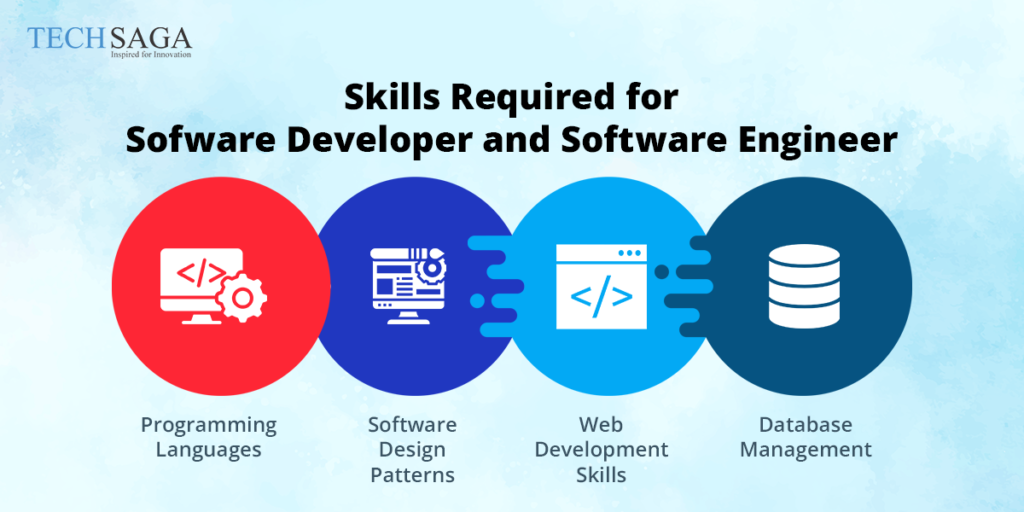Team Techsaga
Gain valuable insights and stay updated with the latest innovations through our engaging blog. Explore trends, technology advancements, and expert opinions to navigate the ever-evolving world of IT.
Software Developer vs. Software Engineer: What’s the Difference?
Software Development
The process of developing, designing, testing, and maintaining software systems or applications is known as software development. Therefore the software developer develops the code to address certain issues or meet the demands of a Software Design Company. The creation of superior software that satisfies user requirements and expectations is the aim of software development.
Who is a software developer?
A programmer or coder who specializes in developing code to construct software is called a software developer. And, software developers are experts who can create, build, and maintain software programs using a variety of programming languages and tools. Therefore, they participate in every stage of the software development life cycle, which includes testing, design, coding, requirements analysis, deployment, and maintenance.
Roles and Responsibilities:
Software developers can specialize in different areas of development, such as:
- Front-end Development: Involves creating the user interface and user experience of an application. Here, JavaScript, CSS, and HTML are among the technologies used by front-end developers.
- Back-end Development: Focuses on server-side logic, databases, and application architecture. Hence, back-end developers use languages like Python, Java, Ruby, or PHP.
- Full-stack Development: Combines both front-end and back-end development skills, allowing developers to work on all aspects of a software application.
- Mobile App Development: It entails developing mobile applications.
Mobile app developers may specialize in iOS (using Swift) or Android (using Java or Kotlin) development.
- DevOps: Involves the integration of enterprise software development services, other software development services and operations, aiming to automate and improve the processes of software delivery and infrastructure management.
- Database Development: Involves designing, implementing, and maintaining databases to ensure efficient data storage and retrieval.
Software Engineering:
Hence, Software engineering is a branch of computer science that focuses on the systematic design, development, testing, and upkeep of software systems. And to guarantee the construction of dependable, effective, and maintainable software solutions, it applies engineering concepts to software development procedures.
Who is a Software Engineer?
Hence, a software engineer is a professional who applies engineering principles to the design, development, testing, and maintenance of software systems. While, Software engineers, also known as software developers or programmers, play a crucial role in creating the digital applications and systems that power modern technology.
Roles and Responsibilities:
- Design: Software engineers participate in the design phase of software development, creating system architectures, defining software components, and planning the overall structure of a software solution.
- Development: Writing code is a core responsibility. Software engineers use programming languages to implement the design, creating software applications, websites, or other digital solutions.
- Testing: Ensuring the quality and reliability of software is essential. Here, Software engineers conduct various testing activities, such as unit testing, integration testing, and system testing, to identify and fix bugs and issues.
- Maintenance: Software engineers are involved in ongoing maintenance and updates to ensure that software remains functional, secure, and compatible with evolving technologies.
- Problem-Solving: Software engineers need strong problem-solving skills to analyze issues, understand user requirements, and develop effective solutions.
- Collaboration: Many software engineering projects involve collaboration with other professionals, including other software engineers, designers, testers, and project managers. Hence, effective communication and teamwork are essential.
- Project Management: Software engineers often participate in project management activities, coordinating tasks, setting timelines, and managing resources to ensure successful project completion.
Key Aspects:
Key aspects of software engineering include:
- Systematic Approach: Software engineering emphasizes a systematic and disciplined approach to software development. So, It involves methodologies and best practices to ensure that the final product meets user requirements and industry standards.
- Project Management: Hence, Software engineers often engage in project management activities, coordinating tasks, setting timelines, and allocating resources effectively to ensure the successful completion of projects.
- Quality Assurance: Ensuring the quality of the software is a crucial aspect of software engineering. Moreover, this involves thorough testing, debugging, and continuous improvement to deliver reliable and robust software.
- Documentation: Software engineers create and maintain comprehensive documentation throughout the development process. Therefore, this documentation helps in understanding the system, troubleshooting issues, and facilitating future updates.
- Collaboration: Software engineering projects typically involve collaboration among a team of professionals, including software developers, designers, testers, and project managers. So, Effective communication and collaboration are essential for successful software engineering projects.
Skills Required for Sofware Developer and Software Engineer:

Programming Languages-
Proficiency in one or more programming languages relevant to the developer’s area of specialization (e.g., Java, Python, JavaScript, C++, C#).
Algorithm and Data Structures-
Understanding and implementing algorithms and data structures to efficiently solve computational problems and manipulate data.
Software Design Patterns-
Knowledge of design patterns to create scalable, maintainable, and modular software solutions.
Version Control/Git-
Familiarity with version control systems, especially Git, to manage and track code changes collaboratively.
Database Management-
With proficiency in working with databases, understanding database design, and using SQL for data manipulation.
Web Development Skills (for Front-End Developers)-
HTML, CSS, and JavaScript proficiency for creating user interfaces and enhancing user experiences.
Back-End Development (for Back-End Developers)-
Server-side programming, understanding of frameworks, and knowledge of databases.
Full-Stack Development-
While, knowledge of both front-end and back-end development to work on entire software stacks.
Differences in Software Developers and Software Engineers:
The terms “software developer” and “software engineer” are often used interchangeably, and the career paths for individuals in these roles can overlap. However, in some contexts and industries, there might be nuanced differences in how these titles are used. So it’s important to note that the distinctions can vary between companies, regions, and individual preferences. Here are some general considerations:
Job Titles-
- In some organizations, the titles “software developer” and “software engineer” may be used interchangeably without significant differences in responsibilities.
- In other cases, a “software engineer” title might be associated with a slightly more senior or specialized role compared to a “software developer.”
Scope of Responsibilities-
- Both software developers and software engineers are typically involved in designing, coding, testing, and maintaining software solutions.
- Software engineers may be perceived as having a broader scope that includes responsibilities beyond coding, such as system architecture, design patterns, and higher-level decision-making.
Specializations-
Hence, the choice of title may sometimes reflect a specialization. For example, someone referred to as a “software engineer” might be more involved in system architecture, algorithm design, or complex problem-solving, while a “software developer” might focus more on coding and implementing solutions.
Level of Experience-
Some organizations may associate the title ‘software engineer’ with more experienced professionals, while using ‘software developer’ for individuals at various experience levels, including entry-level roles.
Educational Background-
While, both roles often require a background in computer science, software engineering, or a related field, some companies may prefer to use the title “software engineer” for individuals with higher education or more extensive experience.
Industry Practices-
Hence, industry practices and regional differences can influence the use of these titles. Here, some regions or industries may have specific conventions for job titles in the software development field.
Read Also:- Approaching Field Service Management Software Development
Wrapping it up:
While the differences between Software Developers and Software Engineers can be subtle and context-dependent, it’s essential for individuals entering the tech industry to understand these distinctions. Both roles play integral parts in the software development process, with Software Developers focusing on coding and implementation, and Software Engineers contributing to higher-level architectural decisions.
Are you an aspiring software developer or software engineer? Looking for an opportunity to work with the Best Software Development Company in Noida? Then you are at the right place where you will be able to shape the future of software developments and IT support solutions.
TAG: Software Development




